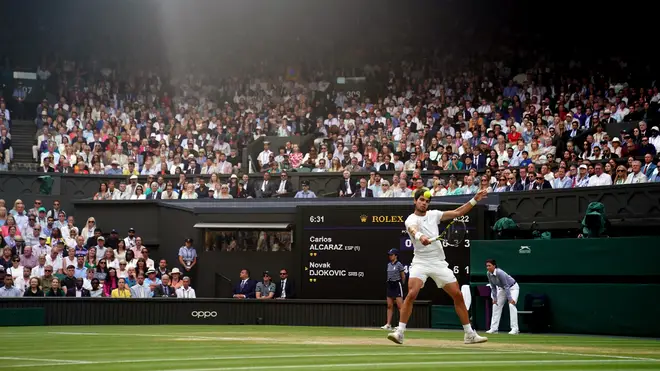
Oli Dugmore 4am - 7am
27 March 2024, 16:34

Oliver Hardiman could be imprisoned after breaching an injunction taken out on him by the All England Lawn Tennis Club, which runs the tournament.
A Wimbledon ticket tout could be jailed for failing to disclose details of his business associates following a High Court ruling.
The All England Lawn Tennis Club, which runs the grand slam tournament, took out an injunction against Oliver Hardiman last July as part of its efforts to combat touts reselling tickets at inflated prices.
It asked the High Court to send him to prison last December after he breached the order.
At a hearing in February, Mr Hardiman was offered a chance to avoid potential custody by sharing details of his business associates, which barristers for the club told the court on Wednesday had not happened.
Mr Hardiman’s lawyers said that the failure to disclose information resulted from “reckless” media reporting of his case, where he had been labelled as a “tout supergrass”, and that he should not be jailed.
Mr Justice Morris will hand down his judgment on whether Mr Hardiman will be jailed next month.
Standard tickets for Wimbledon are issued through a ballot run by the club and cannot be transferred, with visitors required to show photographic ID alongside their ticket when entering.
Debenture seats – seats on Centre Court or No 1 Court which can be used for five years – can legally be transferred or sold.
The injunction issued by a High Court judge last summer barred Mr Hardiman from unlawfully trading tickets for Wimbledon and from being within the vicinity of the club’s premises during the 2023 tournament.
It also obliged him to share details of others involved in touting.

Despite the order, Mr Hardiman was found selling tickets to people queueing to get into the site in south-west London during last year’s competition, and the club asked the court for him to be jailed.
Mr Hardiman admitted breaching the order and being in contempt of court in February this year, with Mr Justice Morris offering him the opportunity to “purge” his contempt and avoid potential custody by sharing details of other touts and complying with the order.
But Edward Rowntree, representing the club, told the court on Wednesday that no information had been provided.
He said: “You are now faced with a defendant who knowingly and consciously decided not to comply with an order.”
He added: “The prejudice to my client is of people touting tickets on the streets of Wimbledon to the inconvenience of residents and the attendees alike, and secondly to unsuspecting and unwary tourists and others who buy tickets at vastly inflated prices, only to be refused access.
“The long-term effect of people of this nature is to stop people who are tennis enthusiasts coming, and that has an impact on the ticket sales. It puts people off.”
Kevin Saunders, representing Mr Hardiman, said his client initially had a “genuine willingness” to co-operate with the court order, but this “evaporated” after “sensationalist” and “erroneous” reporting of his case in the media, in which he was labelled a “tout supergrass”.
The reporting also described him as a “turncoat” and an “informant” against other touts, which led to him being told to stay silent by members of a WhatsApp group containing around 350 others who traded tickets on unregulated markets.
One message sent to him, which Mr Saunders said was a consequence of the press coverage, read: “Can’t believe you have gone grass. Better keep your mouth shut in court otherwise it is on you and your bird deffo.”
Mr Saunders said: “The defendant is not and did not become a supergrass. He is not a turncoat and he is not an informant.
“He is somebody who wanted to purge his contempt and he indicated that at the previous hearing.”
Mr Saunders said that the press reporting had led to “shame, vilification, abuse and marginalisation” of Mr Hardiman, the “punitive effect” of which meant he should not be jailed.
Mr Hardiman attended court with his partner, for whom he is a carer while also having his own medical problems, and “advances an apology to the court”, the hearing was told.